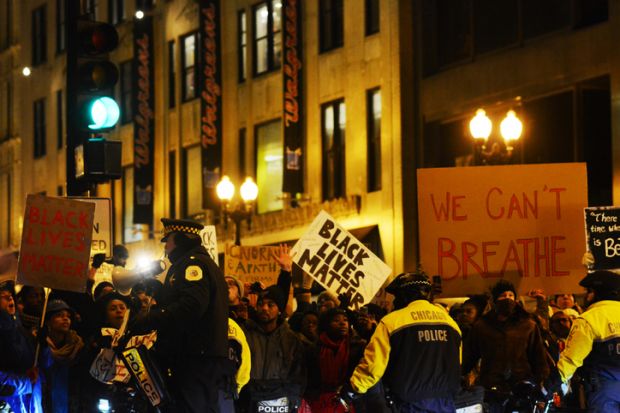Macalester College students facing fines or bail after participating in peaceful protests can now call their college president for help.
Suzanne Rivera, president of the private liberal arts college in Saint Paul, Minnesota, first said in June that the college would help pay bail or reimburse students who incurred fines after they were arrested at peaceful protests.
“Back in June, some Mac students involved in Black Lives Matter protests following the killing of George Floyd told me they were worried they might not be able to afford their fines if they were cited for peacefully protesting in violation of the curfew,” Dr Rivera said in a statement. “I told them that, if the fines were a hardship, they should let me know and I would find a way to cover the costs for any needy student.”
Dr Rivera re-upped her offer on 5 November after students rallied in support of the US’ national vote count.
“I care deeply about both the well-being of our students and their right to practice civil disobedience,” Dr Rivera tweeted. “Any currently enrolled student who participates in civil disobedience and needs help with bail or a fine they cannot afford can seek reimbursement by emailing me.”
She also noted that students who need help after business hours should call the college’s public safety line. So far, no students have requested reimbursement, said Joe Linstroth, a college spokesman.
Dr Rivera is a relatively new president, having taken up the role in June after former president Brian Rosenberg retired in May.
She has received numerous angry calls, emails and at least one threat of violence in response to her tweets last week, she said in a statement.
On Twitter, several people posted critical comments in response to the Star Tribune’s article about Dr Rivera’s offer. Some users were concerned that the president was effectively paying students to break the law. Several others called for Macalester’s federal funding to be pulled. Macalester is a private institution, but its students are eligible to receive federal student aid.
For the most part, Macalester students support Dr Rivera’s move, according to Lindsay Weber and Margaret Moran. Both are students at Macalester and editors in chief of the college newspaper.
“Students love that this is happening and love that she is supporting them and supporting civil disobedience,” Weber said.
“I haven’t really heard anything negative from a Macalester student,” Moran agreed.
Alumni and staff members have also praised Dr Rivera’s decision on Twitter.
“Thank you, Sue, for standing on principles of free speech and equity. Your actions make me proud (again) to be associated with Macalester College,” Adrienne Christiansen, associate professor of political science at Macalester, tweeted in response to Dr Rivera.
Several students received citations for public nuisance at a peaceful protest on 4 November, Weber and Moran said. At least three Macalester students were arrested several weeks ago at protests following the release of Derek Chauvin, one of the former Minneapolis police officers facing charges for killing George Floyd in May.
“Peaceful protest in the form of civil disobedience is a time-honoured tradition in the US, and the rights to assembly and free speech are protected in the Constitution. This is not particular to any specific subject. It is about encouraging civic engagement and social action. Whether students are advocating for ensuring all votes are counted in our elections, which they were last night, or some other cause, I don't think it's my place to pass judgement on their views,” Dr Rivera said in a statement. “The free exchange of ideas − even when done inconveniently − is one of the cornerstones of a liberal arts education. I would defend free speech for our conservative students as vigorously as for our liberal students.”
This is an edited version of a story that first appeared on Inside Higher Ed.




